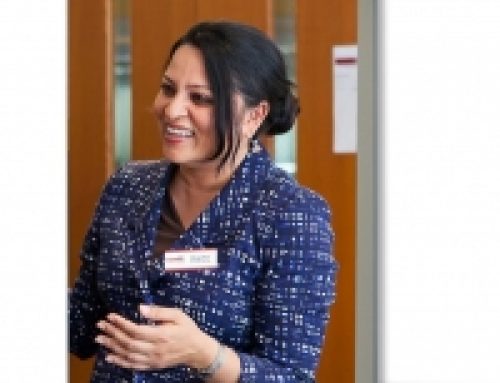Dhru Beeharilal NetIP (Network of Indian Professionals) Spotlight Interview – Being True to You
‘NetIP Spotlight: Live Your Potential is a monthly show featuring experts on trending topics’
“Being True to You”
Jasbina Ahluwalia interviews Dhru Beeharilal
Interview with Dhru Beeharilal, CEO and Head Coach of Delta Learning, Inc.
Dhru will discuss the following topics:
- Importance of being present to strengthen relationships
- Why making yourself a priority is not “selfish”
- #1 thing you are neglecting that could improve your life dramatically
Dhru Beeharilal graduated from law school in 2008 with a focus on trial advocacy, courtroom presentation, and public speaking. An aspiring renaissance man, Dhru has studied graphic design, writing, and the creative arts for over 15 years, social dynamics and human interaction for over 10 years, public speaking, client management, and seminar delivery for over 9 years, and professional and academic development for the last 8 years.
After seeing firsthand and experiencing the quality of training out there for those of us with goals of increasing social comfort, Dhru decided to collaborate with others who shared his vision to create Delta Learning, Inc. Dhru’s approach in social interaction, and in life, is a natural approach: be yourself, the best of yourself, and you will attract the best for yourself, in all aspects of life.
_____
—> [VIDEO] Love At First Sight – Is It Possible?
_____
(00:47): Hello everyone. Welcome to our third month of NetIP Spotlight: Live Your Potential where we invite guest experts to speak on a variety of trending topics that matter to you. I’m Jasbina Ahluwalia, your host. I want to warmly welcome you to our show this evening.
I know everyone is crazy busy these days. I appreciate your investing time and joining us this evening. To give you a lay of the land, our guest speaker and I will be discussing his insights for about 20 to 25 minutes. After the discussion, you’ll have the opportunity to ask him any questions that you might have. With that said, lets’ jump in.
Today’s guest speaker is Dhru Beeharilal. After graduating from law school in 2008, Dhru shifted his professional focus to project management and training. An aspiring renaissance man, Dhru has studied graphic design, writing and the creative arts, social dynamics and human interaction, public speaking, client management, seminar and training, design and delivery and professional and academic development.
After developing specific interests in human excellence, Dhru made it a point to study and learn as much as he could about human psychology and behavior, neurolinguistic programming and body language.
In 2013, in the spirit of personal development, Dhru founded Delta Learning, Inc. a company devoted to professional, social and personal growth and the pursuit of human excellence. Dhru currently serves as VP of NetSAP, DC and CEO of Delta Learning, Inc. Welcome to the show, Dhru.
Dhru Beeharilal
(2:32): Thank you, Jasbina. I’m happy to be here.
(2:35): What a fascinating bio. Given the diversity of your professional experiences, I wanted to start off by asking you to share any guidance you may have for our listeners from your own experience regarding career transitions, especially with taking risks and detours in one’s career.
Dhru Beeharilal
(2:54): It depends on where you are in your career. Generally, the earlier on you are in your career, the more likely you are to take risks. In the first six years or so, you can take more risks and pursue more opportunities based on what you want. In seven to ten years, it’s a more medium risk time. With ten-plus years, people typically tend to be more wedded to their jobs and companies because they’ve been there for so long and their retirement will vest.
The younger you are in general, the more risk you’re able to take. You can bounce back from it a lot easier and explain a lot more about it. The key is finding out what you really want to do for the rest of your life.
Gone are the days where you’re with one company for your entire life, like our parent’s generation. That was what they did. They got a job in their 20s. They worked that way until retirement or before. Nowadays, it’s all about detours and transitions. Ask anyone who has had a job one year. Two years from now, you don’t have the same job. That’s just the way it is nowadays. The important thing to remember is if you don’t ask for whatever you want, whether it’s more money, a different position or to put yourself forward, the answer is always going to be no.
(4:06): I think that’s a great point. It’s about asking sometimes. I think people hold themselves back and don’t ask.
In addition to the professional and personal development company that you founded, I understand you’re in the process of starting a real estate investment company. What are the greatest challenges in starting companies from the ground up? For those people who are considering starting their own companies, do you have any suggestions or things to keep in mind with respect to going out on your own and starting your own venture?
Dhru Beeharilal
(4:44): I would encourage anyone who has an interest in becoming an entrepreneur to do so, especially nowadays with companies and the market the way it is. It’s actually better to go out on your own and do what you want to do. That being said, there are some serious challenges.
First, you have to know the three questions that I always ask. They are who, why and how. Who is very important. Ninety-five percent of all businesses that start, fail in the first year. One of the major reasons is because of partners. You have to be very selective on who you partner up with.
I made the mistake of partnering with friends just because they’re my friends. That didn’t turn out the way I wanted it to turn out. Luckily, it wasn’t too much of an investment. At that point, we worked things out. But not everyone is that lucky. Be very selective in who you partner up with and choose to take on with you. At the end of the day, it’s your company. Whatever they do, your company name is on the line. The buck stops with you in that sense.
The second question would be why, as in why you’re doing it. You have to ask that question. You have to know your goals and beliefs. Money alone is not going to be a good reason. Sure, we all want to be financially independent. We all want to create a life for ourselves and security for our families.
At the same time, you can’t just expect to say, “Okay, I’m going to start a business doing something I hate that makes a lot of money.” That’s all you’re going to be doing. You’re not going to be working 9:00 to 5:00 if it’s your business. You’re going to be working from 9:00 to the next morning at 9:00 again. You’re always working.
The last thing is how. You want to know how you’re going to get there. You want to have a plan laid out. Things aren’t always going to go according to plan, but you want to at least have a general plan of how you want things to fall. Once you get that plan in action, you will have to make adjustments here and there.
As long as you have a plan of where you want to go, how you want to get there and have patience, that’s where you want to be. You want to create a power team of advisors, people who are selective in their own circles and experience. They will be able to advise you as far as where you want to be.
_____
[More from Jasbina] —> [INTERVIEW] Deepa Iyer NetIP (Network of Indian Professionals) Interview – Leading & Working at Non-Profits_____
(7:12): I think that’s great. By having a board of advisors with skills complementary to a skillset that you may not have, you can really add that value as you’re beginning. I think that’s great advice. You mentioned who, why and how. Let me ask you about the who.
I can appreciate how important it is that, if you’re going to partner up with someone, you choose that partner very selectively. Do you have any suggestions for someone who is thinking through different people who may be viable partners for them?
Dhru Beeharilal
(7:52): You hit on one of the major ones, which is that you want to get someone who shares your values on one hand, but can also complement the way you work. If you know business really well, you want someone who has innovation and ideas. You want someone who can be very stimulating as far as generating ideas of ways to improve the business overall and create products and services.
On the other side, if you’re very creative and you have a lot of ideas of the things you want to do, you want to get someone who knows business. You don’t necessarily know your way around all the financials and the different markets. A great example is Disney. Walt Disney was the creative mind behind everything. A lot of people don’t know this but, if it wasn’t for his older brother Roy Disney, he was the one who actually created the corporation and dealt with all of the financials. If that didn’t happen, Disney would have been nothing but an artist.
(8:49): That’s interesting. I actually didn’t know that story. I think that happens a lot in terms of having the idea person and the execution person. Now we’ll switch gears to personal development. I believe that you would agree, these skills are very transferable to personal and professional. In terms of personal development, tell us about the importance of being present to strengthen relationships.
Dhru Beeharilal
(9:22): I can’t overstate how important it is to be present. It’s probably one of the most important things. People say that communication and trust are very important. Being present is how you build trust and have communication. Without being present, you won’t communicate effectively. If you’re not attentive, if you don’t listen to what the other person is saying and if you’re not open to listening and taking that person’s perspective into consideration, you’re not going to be able to communicate properly.
You’re not going to see their point of view. I always tell my clients and friends to live in the now. Time thinking about the past and future is wasted. Planning is great, but don’t get caught up in it. You can think about your future for your entire life if you want to, but you will miss the present.
Another thing that I tell people, especially about relationships, is that you don’t want to project past pain, insecurities or experiences on anyone in the present. They may not be the ones who have caused that pain in the past or who have been there with you in the past. They are totally innocent and you think, “This person said X, Y and Z. That triggers a certain memory I have of another person in the past.” That’s not fair to the person in the present. You have to be present and take things for what they are right now, not for what you think they are.
_____
[More from Jasbina] —> [INTERVIEW] Neely Steinberg Interview – Unleashing Your Inner Entrepreneur to Find Love—> [VIDEO] Men Are Obsolete – Are They?
—> [INTERVIEW] Susan Winter Interview – How To Live The Life You Desire?
—> [BLOG] Anticipation Stress – 5 Ways To Reduce It
_____
(10:42): I cannot agree with you more. The idea of the next man or woman has nothing to do with the last. I think that’s wonderful advice. It struck me when you talked about being present in terms of building trust.
In terms of the transferability of these skills from personal to professional, building a company, having your team have trust and own your goals and beliefs is all related. Since your company does deal with both personal and professional development, do you find yourself with a client that you’re dealing with personally or professionally almost talking the same language?
Dhru Beeharilal
(11:32): Yes. There is so much overlap, it’s unbelievable. Each company is like a person in itself. It has its own beliefs. It has its own personality. What works for one company won’t necessarily work for another company as far as success. It’s the same thing with a person. I think people miss that sometimes. They get caught up with the services that the company offers or the interests that a person has.
Being able to communicate those interests and beliefs that a company has, as well as a person, are almost as important as the interests and beliefs themselves. People get caught up in that a lot. I think that’s something that people need to realize. It’s more about communication, being present and knowing that you have to be in the moment and live in the right now.
(12:24): From your experience and expertise in professional and personal development, what is the top most thing that you could be neglecting that could improve your life dramatically? What might that be?
Dhru Beeharilal
(12:43): A lot of people don’t realize it, but they neglect themselves. Look at everyone’s day. Take a look at your Google calendar or your work calendar. Tell me how many events you have in there that are just for yourself. What time do you have set aside for yourself in those calendars? I can guarantee you that most people don’t have any time set aside for themselves, even just for reflection.
Many times, I have clients who will say, “How do I know what to talk about on a date? How do I know what this girl wants to talk about? I feel like I’m going to be boring to this girl.” My answer is always the same. Why do you think you’re going to be boring? If you’re interested in it then it doesn’t matter if they’re interested in it or not. That’s the whole point of dating. It’s to figure out who is a good match.
If that person is not interested in what you’re interested in then you’ve weeded them out. That’s not a bad thing. That’s a good thing. You’re not wasting your time or their time. Do what you want to do. Go out to places that you want to go to.
Don’t think, “Where do girls or guys hang out? I’m going to go there.” If you don’t have an interest in being there, you’re not going to be happy there. You’re not going to look happy. When you talk to someone then they’re going to see that you’re not having a good time there. Why would you want to have a bad time just to say, “I might meet someone there?”
My advice is to take chances. Experience new things all the time. I’m not saying not to do that. If you don’t have an interest in doing something, don’t do it. Don’t waste your time. Time is so precious. You could be doing something so much more fun. Chances are, other people will be doing those fun things too that you can share interests with. If you meet someone there, those will be the bonds that last.
(14:28): I think that makes sense. What I find is that, when you’re truly excited about something, there is an energy to that. I may not even be interested in a topic but if someone really is, you almost feed off that energy. I do not think you can go wrong by expressing what you’re passionate about regardless of what it is. I really appreciate you sharing your insights with us. It’s been really interesting.
I’m wondering if you have any last thoughts or message you’d like to share with our listeners before we jump into Q&A and give our listeners a chance to ask you questions directly.
Dhru Beeharilal
(15:07): As you said, there is an energy. That energy is very infectious. Always pursue your interests and passions. I tell that to everyone. Take some time out every day. Start with five or ten minutes. I think everyone, whether you’re a doctor or lawyer, can take five to ten minutes out of your day in quiet. Relax and reflect on yourself, where you want to be and what you want to be known for.
That’s a question I ask people. It’s not what you’re good at now. It’s not what you will be great at later. It’s not what you hate. What do you want to be known for? When you hear people talking about you, if you could be invisible, what would you want them to say about you? Then act accordingly. That will work itself out.
(15:57): I love that. What do you want to be known for? Everyone, now is your chance to ask Dhru any questions which may have come up for you. I am going to go to the first question. Hi, this is Jasbina.
Caller One
(16:22): Hi. Dhru, I have a question about something you mentioned in the interview about asking your boss for a raise or asking for more responsibilities. For example, my boss has asked me quite a few times if I’m happy in my role and if I like what I’m doing. I wonder where the boundaries are in that question.
I’m not actually happy with what I’m doing. It’s a fairly new job. I’m in a pickle in what to do. I know that she’s said that I can definitely expand my role in the future and do all these other things, which is great. But I also feel bad saying, “I’d rather be in that department.” I’m lost on where to take this and how to do it for my benefit. Where can I go with this? Where is the boundary of what I can and can’t say without getting in trouble or getting fired? I guess that’s my fear.
Dhru Beeharilal
(17:29): That’s a fear that a lot of people have when they start a new job of any kind, whether they’re with the same company or a new company. That’s an issue that they have. Let’s talk about your relationship with your boss. Is she a new boss? Is she someone you’ve known before?
Caller One
(17:46): She’s a new boss. I started in August so it’s a fairly new relationship.
Dhru Beeharilal
(17:51): So you didn’t know her before that?
Caller One
(17:52): No.
Dhru Beeharilal
(17:53): Your rapport with her is pretty weak in general. You can tread lightly. You definitely don’t want to say, “I hate my job. I can’t stand it.” I would say to be as honest as you can be. They’re not going to fire you for not enjoying your job. I’ve missed that in the past as well. I’ve made the mistake of not saying anything. You just end up unhappy.
She’s probably asking the question because it’s a new role. She wants to see how you fit in that role. Some people out there are trying to be good managers. There are a lot of bad ones out there, don’t get me wrong. Some people try to be good managers. Part of that is making sure that your subordinates are developing where they want to develop.
On top of that, you have to see it from her perspective, too. If you’re not happy with what you’re doing, you’re not going to do it as well as if you were happy. She wants you to be productive and effective at what you’re doing. If you could be happier somewhere else that she can fit you in, she’ll work on trying to do that if she’s a good manager.
Start by talking to her about it. Begin the conversation. Be honest but don’t go all the way if you don’t feel comfortable. Start the conversation in such a way that you’re cautious, but be as honest as you can be. That’s the way to start. You’re hurting yourself right now because you’re not enjoying what you’re doing. The chance of you moving to a different job is zero if you don’t talk to her about it. If you do talk to her about it then you have a 50/50 chance. Maybe she will say, “There is another position over here where we can fit you in. You might enjoy that a lot more.”
Caller One
(19:31): Yes, okay. I have another question. You mentioned following your interests and passions. I strongly believe in that, too. What if people don’t necessarily realize or have an idea of what they’re interested in or passion about? They say, “I don’t know what I’m passionate about.” I’m curious as to how I can reply to those people as well as figuring it out for myself, too.
Dhru Beeharilal
(20:06): That’s a great question. That comes up a lot. Unfortunately, that question could take days or months to answer. I can give you a short answer. That personal reflection time that I mentioned earlier will be key to that. In today’s world, we’re pushed to go to school. When we finish high school, we’re pushed to go to college. When you finish college, sometimes you get pushed to go to grad school, med school or law school.
There is no real time to reflect and think, “Do I really want to do this? What do I really want to do?” There’s not a lot of room for that, especially in our culture. It’s very go, go, go. People say, “You’re successful? Get married.” There’s no room to say, “Let me take a day or a month to figure out what I want to do.” That 15 or 20 minutes that you take every day for reflection time will allow you more insight into your own psyche and what you want to do. Your mind will wander for a while. It’s a meditation type thing. It’s not purely meditation because you’re letting your mind go a little bit. You relax and reset. That alone will allow you to get more clarity as far as what you really want to do.
Another idea that I tell my clients is that there might be something that you enjoy doing, like a hobby. Not all hobbies can be professions, but if you have a hobby that you really enjoy, ask yourself what it is about that hobby that you enjoy. If you have several hobbies, try to find something in common, or a base at the core of those hobbies. Ask yourself, “Is there a career in this that I could do?” If not, then that’s fine. You can keep looking. It’s definitely a question worth answering. There is a reason that you have these hobbies. There is a reason that we all have our hobbies and interests. Our internal dialogue knows that answer. We just have to engage that dialogue.
Caller One
(21:59): Yes. I’m sorry, I have one more follow-up question. You said something that triggered my interests. Now I’m in reflection time. What comes up is maybe what I think I want, but then also what I was taught to want. I struggle sometimes personally with that. Do I really want this or do I want this because that’s what everyone else is doing and it’s what I was taught when I was younger? Do you have any advice on how to know the difference between them?
Dhru Beeharilal
(22:35): Ask the same questions you asked just now. Why do I want this? What would this accomplish? What would getting this degree, certification or job accomplish in my life? Can I see myself being happier with this thing in my life? If I can see myself being happy with it, then okay. That’s great. I might also think, “I don’t know. I can go either way. Is it really something that I want? Is it something that my parents want? Is it something that my friends all have? Do I think it would be nice to have so that I can have a conversation piece?”
That’s also something that happens sometimes. We all have friends who have certain things. When they have them and we don’t, we feel left out. It’s natural. It’s human nature. That’s something you have to ask yourself. That’s the internal dialogue. If you create that dialogue with yourself, you will be able to engage yourself. You will think, “What do I really want? What’s really important to me versus what’s important to everyone else in my life?”
Caller One
(23:39): Okay. I guess I have some reflecting to do.
Dhru Beeharilal
(23:41): We all do.
(23:49): We’re going to go to the next question. Welcome, caller.
Caller Two
(23:55): Hi. Thank you, Jasbina. Dhru, thank you very much for taking the time. The conversation was very insightful. You mentioned the importance of choosing the right partner when you plan to start your business. How do you know whether you need partners?
Dhru Beeharilal
(24:14): That’s a good question. When you’re getting into any kind of business, you want to start off doing research on what kind of business it is. As you do the research, you will see gaps in your knowledge. You will see competitors and what they’re doing. You can ask yourself questions like, “How are they doing this? What are they doing for that?” You realize, “I don’t know the answer to that question.” You can’t easily Google it.
You start reaching out to people in general. My advice is to always start off asking people questions. Don’t necessarily engage people as partners as a first question. Just start asking questions. Any person who is an entrepreneur will not have a problem answering questions about how they got started and their first steps. Those are very basic things that anyone will answer.
As you ask those questions of people in your life in general, more questions will come up. If you find yourself having more questions come up and you think, “I don’t want to ask this person 1,000 questions. It’s not the SAT,” then you can say, “Maybe I do need to bring someone else in on this and figure out what I need to go.”
Bringing people into your business doesn’t necessarily mean that you have to bring them in as partners. They can just be advisors as well. The important thing is, when you bring in people who are advisors, you have to bring in people who you trust and who know what they’re talking about. You have to actually listen to them. That’s the tricky part. If you don’t listen to them then there is no point in them being there.
Caller Two
(25:52): Right, of course. That’s a very fair point. It sounds like there is a strong balance that needs to be struck between trust and experience when you are choosing these partners.
Dhru Beeharilal
(26:02): Of course.
Caller Two
(26:04): Thank you so much.
(26:10): Here is our next question. Welcome, caller.
Caller Three
(26:15): Thank you for your time. I just finished business school. I’m one of the younger guys in my group. I’m trying to learn how to exert influence without having the title or authority given to me. I want to build my credibility at the company and try to show that I have the strengths and capabilities.
People that I work with are older than me. I don’t have an official manager title. I was wondering if there is advice you can give to someone who is relatively young in their tenure at a company but wants to exert more influence on people and start developing managerial skills without actually having that title.
Dhru Beeharilal
(27:06): One great way to do that is a very simple way that a lot of people overlook. It is body language. If you are walking into a room and you look around, you can tell who the higher level executive is by the way that they’re sitting, standing or the way that they walk. If you start emulating those higher level executives in the way that you behave, that’s one very subtle but effective way. People will start regarding you differently. The way you carry yourself is very powerful. I don’t think enough people realize that.
There is also the way that you dress. I don’t know how you dress. Dress for the position you want, not the position you’re in. Many times, people will ask why I’m wearing a suit to my job. I see clients on a daily basis but I don’t necessarily have to wear a suit. It’s because I value myself at that level. I feel that I have an image to protect. I want my clients to feel like they’re being seen by someone who is professional. It’s the same idea. You’re a professional. You’re not trying to show off. You’re saying, “This is the way that I think about myself. My appearance is how I feel about myself.”
If you want to educate yourself, feel free to jump into audio books. Kindle and Audible have amazing resources that you can listen to on the ride to and from work. They educate you really well.
When you feel like you can contribute, jump in. Don’t be afraid to jump in and talk. That’s how you get noticed. That’s how those in a higher level in your company will notice, “That guy actually knows what he’s talking about. I’ll value his input in the future, even if he is young.” That will make you some enemies, obviously. People who are older will feel more threatened by you. That’s a different conversation. For now, that’s a good place to start.
Caller Three
(29:00): That’s great. I have one last question. Another area that I think my company sometimes struggles with is giving advice on how to deal with difficult colleagues. It is essentially conflict resolution. My job requires that we be very creative and innovative with out-of-the-box thinking. That can create friction. People with think that their ideas are better than others.
Do you have advice on how to handle confrontational colleagues or friction in the workplace to make sure you’re maintaining friendships and not ostracizing yourself or causing problems? You don’t want to develop a bad reputation. Do you have any advice on how to deal with conflict?
Dhru Beeharilal
(29:57): It’s not bad to have work friends, but be careful about drawing a line between having colleagues and co-workers versus friends. A lot of people won’t draw that line and it’ important to do. You want to make sure that they respect you as a colleague. If you get promoted and they think you’re a friend, they will take advantage of that.
It’s a much longer conversation about difficult colleagues. There are small things you can do regarding ideas being heard. Acknowledge what they’re saying. A lot of times, people will say something and they just want people to acknowledge that they said it. You can say, “That’s a really good idea. I think that’s worth exploring. Why don’t we hold off until another discussion?” It sounds submissive, but that little acknowledgment by telling them that you will talk about it another time, it will give that person a feeling of, “I was heard. People hear what I’m talking about.” Then do address it with them. After the meeting, you can say, “I thought that was a really good idea. Let’s talk about it more.” That will build their respect for you.
They will think, “That guy actually listened to me. He listened to what I said. Whether everyone else talked about it in the meeting or not, that guy knows what I’m talking about. He took the time to reach out to me about it.” Small things like that will really help in those situations. Otherwise, it’s a personality-based question so it’s hard to answer on the phone about that.
Caller Three
(31:36): Yes. Thank you. That was good advice.
(31:42): Thanks for taking our listener’s questions, Dhru. What’s the best way for our listeners to contact you if they want to contact you in the future?
Dhru Beeharilal
(31:51): Email is probably the easiest way. My email address is dhru@deltalearninginc.com. Our website is www.DeltaLearningInc.com. We also have a Facebook group as well. We post on it all the time. We answer questions as often as we get them. Anything that anyone needs, feel free to reach out. I’d be happy to help.
(32:24): Thank you so much. Thank you for your insights and for answering our questions.
Dhru Beeharilal
(32:30): Anytime, Jasbina. Thank you.
(32:33): It’s been a pleasure having you on. In case you joined us late or if you’d like to share this show with people in your life, a recording of this show will be sent out. I appreciate everyone hanging out with us. Make sure to join us for next month’s show. We hope that you’ll be joining us at the 23rd Annual NetIP Conference this Labor Day weekend in Atlanta. Goodnight, everyone.
______
What do you think?
Would you like to add to the insights shared by Dhru Beeharilal? Share your thoughts in the comments below.
_____





